Sustainable and Responsible Tourism Management
VerifiedAdded on 2023/01/03
|13
|4043
|1
AI Summary
This document provides an overview of sustainable and responsible tourism management. It discusses the evolution of sustainable tourism, the roles and responsibilities of leading organizations, and the process of tourism development and planning. The document also explores the impacts of tourism activity and the approaches to tourism development and planning.
Contribute Materials
Your contribution can guide someone’s learning journey. Share your
documents today.
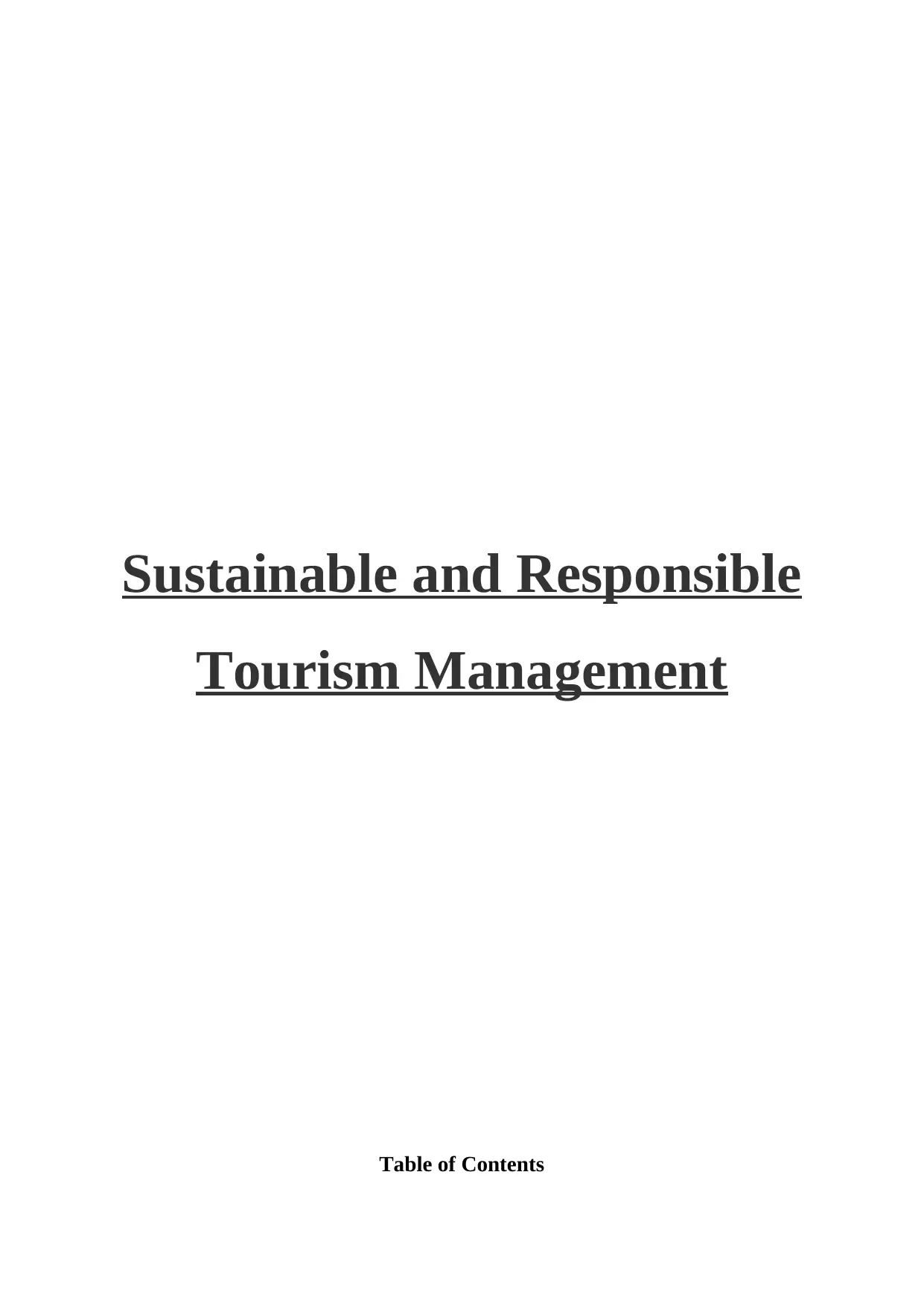
Sustainable and Responsible
Tourism Management
Table of Contents
Tourism Management
Table of Contents
Secure Best Marks with AI Grader
Need help grading? Try our AI Grader for instant feedback on your assignments.
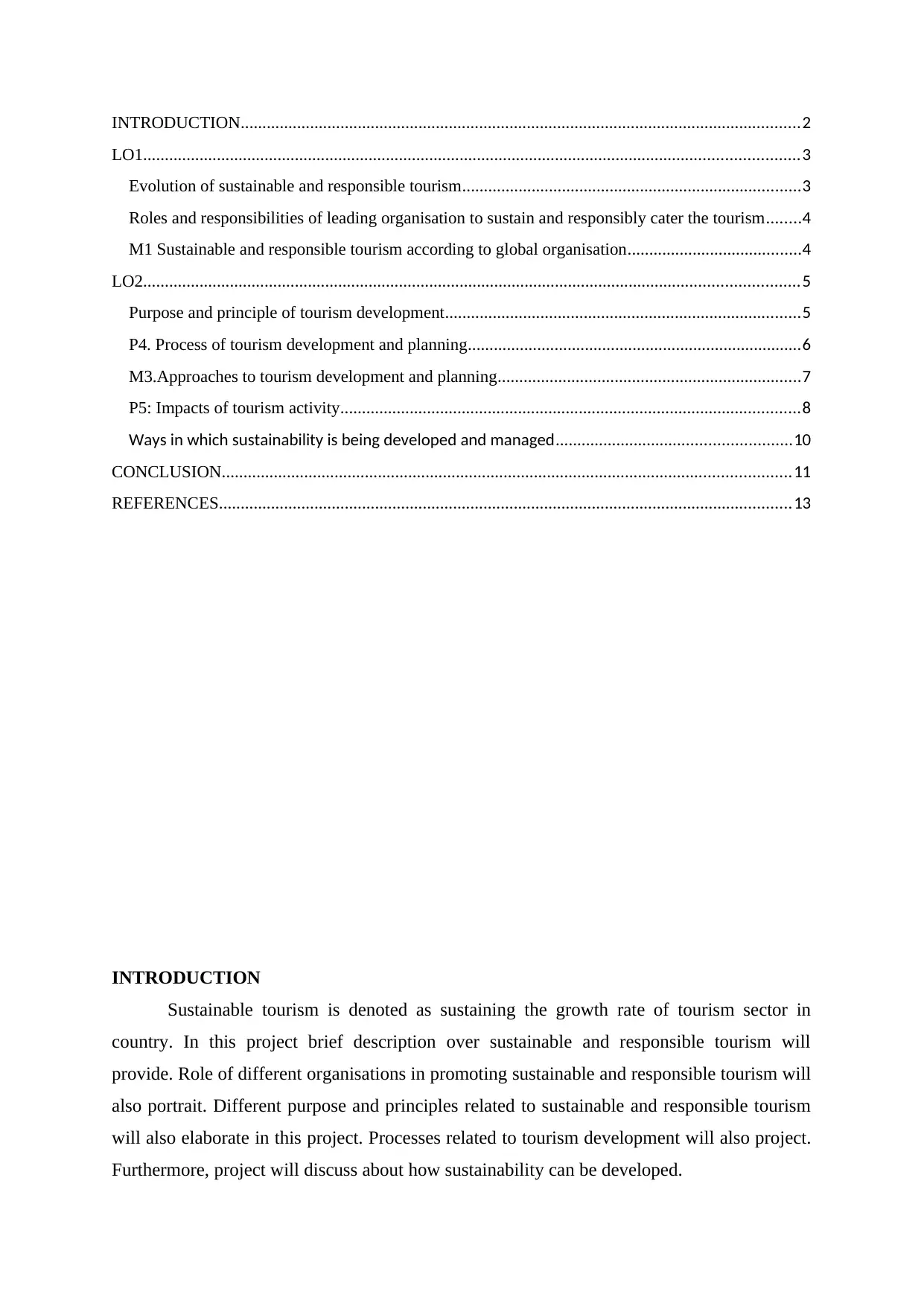
INTRODUCTION.................................................................................................................................2
LO1.......................................................................................................................................................3
Evolution of sustainable and responsible tourism..............................................................................3
Roles and responsibilities of leading organisation to sustain and responsibly cater the tourism........4
M1 Sustainable and responsible tourism according to global organisation........................................4
LO2.......................................................................................................................................................5
Purpose and principle of tourism development..................................................................................5
P4. Process of tourism development and planning.............................................................................6
M3.Approaches to tourism development and planning......................................................................7
P5: Impacts of tourism activity..........................................................................................................8
Ways in which sustainability is being developed and managed......................................................10
CONCLUSION...................................................................................................................................11
REFERENCES....................................................................................................................................13
INTRODUCTION
Sustainable tourism is denoted as sustaining the growth rate of tourism sector in
country. In this project brief description over sustainable and responsible tourism will
provide. Role of different organisations in promoting sustainable and responsible tourism will
also portrait. Different purpose and principles related to sustainable and responsible tourism
will also elaborate in this project. Processes related to tourism development will also project.
Furthermore, project will discuss about how sustainability can be developed.
LO1.......................................................................................................................................................3
Evolution of sustainable and responsible tourism..............................................................................3
Roles and responsibilities of leading organisation to sustain and responsibly cater the tourism........4
M1 Sustainable and responsible tourism according to global organisation........................................4
LO2.......................................................................................................................................................5
Purpose and principle of tourism development..................................................................................5
P4. Process of tourism development and planning.............................................................................6
M3.Approaches to tourism development and planning......................................................................7
P5: Impacts of tourism activity..........................................................................................................8
Ways in which sustainability is being developed and managed......................................................10
CONCLUSION...................................................................................................................................11
REFERENCES....................................................................................................................................13
INTRODUCTION
Sustainable tourism is denoted as sustaining the growth rate of tourism sector in
country. In this project brief description over sustainable and responsible tourism will
provide. Role of different organisations in promoting sustainable and responsible tourism will
also portrait. Different purpose and principles related to sustainable and responsible tourism
will also elaborate in this project. Processes related to tourism development will also project.
Furthermore, project will discuss about how sustainability can be developed.
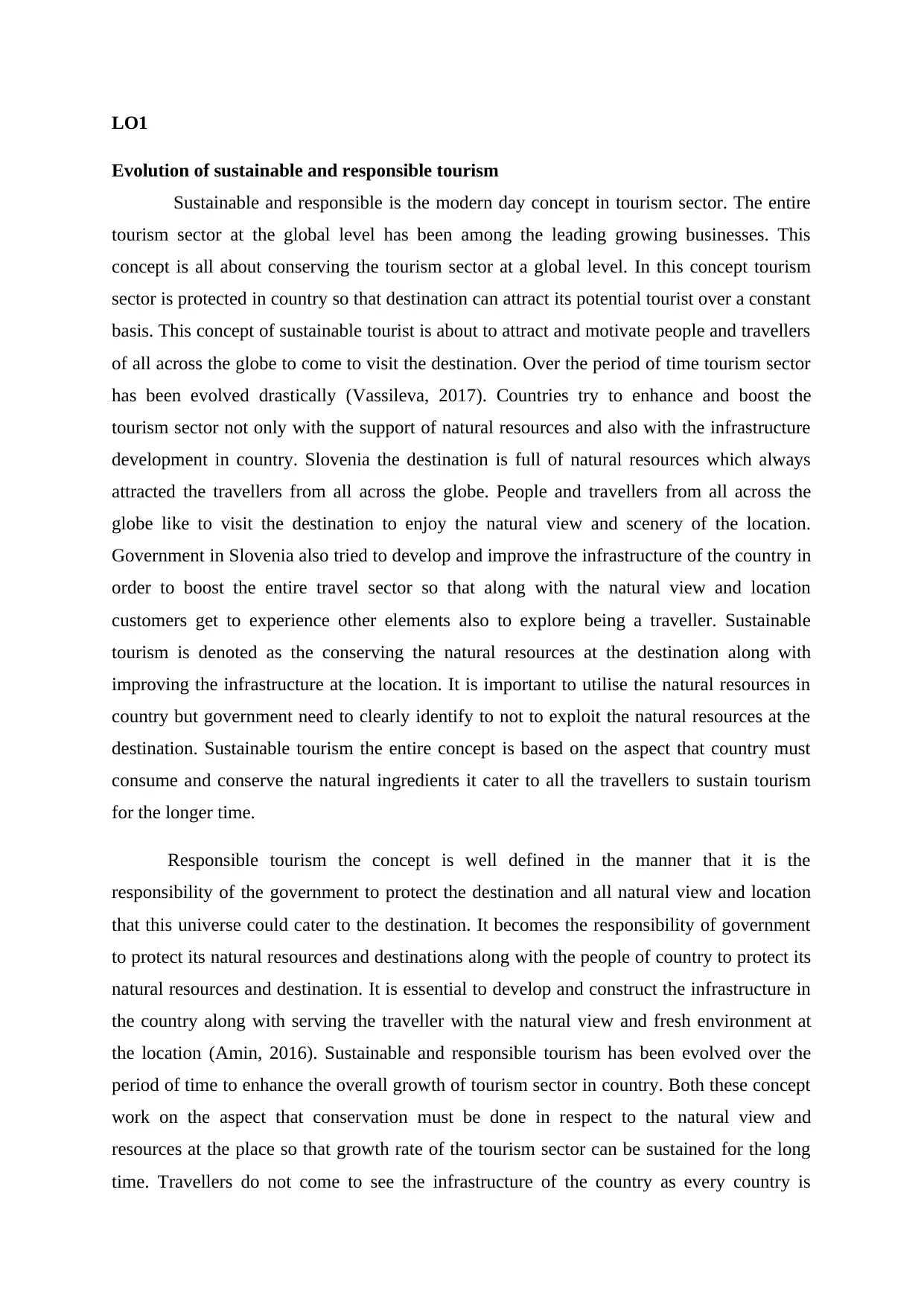
LO1
Evolution of sustainable and responsible tourism
Sustainable and responsible is the modern day concept in tourism sector. The entire
tourism sector at the global level has been among the leading growing businesses. This
concept is all about conserving the tourism sector at a global level. In this concept tourism
sector is protected in country so that destination can attract its potential tourist over a constant
basis. This concept of sustainable tourist is about to attract and motivate people and travellers
of all across the globe to come to visit the destination. Over the period of time tourism sector
has been evolved drastically (Vassileva, 2017). Countries try to enhance and boost the
tourism sector not only with the support of natural resources and also with the infrastructure
development in country. Slovenia the destination is full of natural resources which always
attracted the travellers from all across the globe. People and travellers from all across the
globe like to visit the destination to enjoy the natural view and scenery of the location.
Government in Slovenia also tried to develop and improve the infrastructure of the country in
order to boost the entire travel sector so that along with the natural view and location
customers get to experience other elements also to explore being a traveller. Sustainable
tourism is denoted as the conserving the natural resources at the destination along with
improving the infrastructure at the location. It is important to utilise the natural resources in
country but government need to clearly identify to not to exploit the natural resources at the
destination. Sustainable tourism the entire concept is based on the aspect that country must
consume and conserve the natural ingredients it cater to all the travellers to sustain tourism
for the longer time.
Responsible tourism the concept is well defined in the manner that it is the
responsibility of the government to protect the destination and all natural view and location
that this universe could cater to the destination. It becomes the responsibility of government
to protect its natural resources and destinations along with the people of country to protect its
natural resources and destination. It is essential to develop and construct the infrastructure in
the country along with serving the traveller with the natural view and fresh environment at
the location (Amin, 2016). Sustainable and responsible tourism has been evolved over the
period of time to enhance the overall growth of tourism sector in country. Both these concept
work on the aspect that conservation must be done in respect to the natural view and
resources at the place so that growth rate of the tourism sector can be sustained for the long
time. Travellers do not come to see the infrastructure of the country as every country is
Evolution of sustainable and responsible tourism
Sustainable and responsible is the modern day concept in tourism sector. The entire
tourism sector at the global level has been among the leading growing businesses. This
concept is all about conserving the tourism sector at a global level. In this concept tourism
sector is protected in country so that destination can attract its potential tourist over a constant
basis. This concept of sustainable tourist is about to attract and motivate people and travellers
of all across the globe to come to visit the destination. Over the period of time tourism sector
has been evolved drastically (Vassileva, 2017). Countries try to enhance and boost the
tourism sector not only with the support of natural resources and also with the infrastructure
development in country. Slovenia the destination is full of natural resources which always
attracted the travellers from all across the globe. People and travellers from all across the
globe like to visit the destination to enjoy the natural view and scenery of the location.
Government in Slovenia also tried to develop and improve the infrastructure of the country in
order to boost the entire travel sector so that along with the natural view and location
customers get to experience other elements also to explore being a traveller. Sustainable
tourism is denoted as the conserving the natural resources at the destination along with
improving the infrastructure at the location. It is important to utilise the natural resources in
country but government need to clearly identify to not to exploit the natural resources at the
destination. Sustainable tourism the entire concept is based on the aspect that country must
consume and conserve the natural ingredients it cater to all the travellers to sustain tourism
for the longer time.
Responsible tourism the concept is well defined in the manner that it is the
responsibility of the government to protect the destination and all natural view and location
that this universe could cater to the destination. It becomes the responsibility of government
to protect its natural resources and destinations along with the people of country to protect its
natural resources and destination. It is essential to develop and construct the infrastructure in
the country along with serving the traveller with the natural view and fresh environment at
the location (Amin, 2016). Sustainable and responsible tourism has been evolved over the
period of time to enhance the overall growth of tourism sector in country. Both these concept
work on the aspect that conservation must be done in respect to the natural view and
resources at the place so that growth rate of the tourism sector can be sustained for the long
time. Travellers do not come to see the infrastructure of the country as every country is
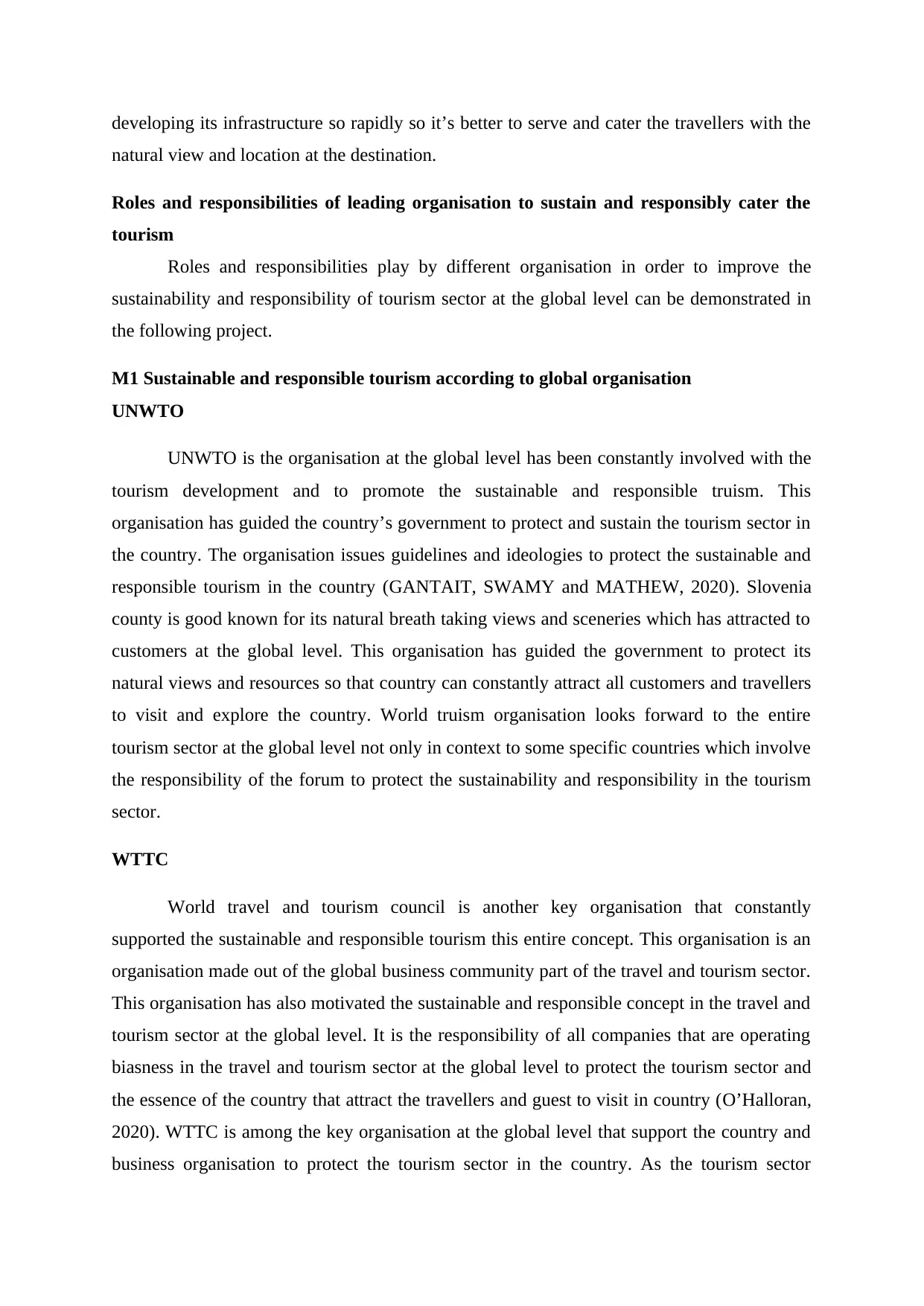
developing its infrastructure so rapidly so it’s better to serve and cater the travellers with the
natural view and location at the destination.
Roles and responsibilities of leading organisation to sustain and responsibly cater the
tourism
Roles and responsibilities play by different organisation in order to improve the
sustainability and responsibility of tourism sector at the global level can be demonstrated in
the following project.
M1 Sustainable and responsible tourism according to global organisation
UNWTO
UNWTO is the organisation at the global level has been constantly involved with the
tourism development and to promote the sustainable and responsible truism. This
organisation has guided the country’s government to protect and sustain the tourism sector in
the country. The organisation issues guidelines and ideologies to protect the sustainable and
responsible tourism in the country (GANTAIT, SWAMY and MATHEW, 2020). Slovenia
county is good known for its natural breath taking views and sceneries which has attracted to
customers at the global level. This organisation has guided the government to protect its
natural views and resources so that country can constantly attract all customers and travellers
to visit and explore the country. World truism organisation looks forward to the entire
tourism sector at the global level not only in context to some specific countries which involve
the responsibility of the forum to protect the sustainability and responsibility in the tourism
sector.
WTTC
World travel and tourism council is another key organisation that constantly
supported the sustainable and responsible tourism this entire concept. This organisation is an
organisation made out of the global business community part of the travel and tourism sector.
This organisation has also motivated the sustainable and responsible concept in the travel and
tourism sector at the global level. It is the responsibility of all companies that are operating
biasness in the travel and tourism sector at the global level to protect the tourism sector and
the essence of the country that attract the travellers and guest to visit in country (O’Halloran,
2020). WTTC is among the key organisation at the global level that support the country and
business organisation to protect the tourism sector in the country. As the tourism sector
natural view and location at the destination.
Roles and responsibilities of leading organisation to sustain and responsibly cater the
tourism
Roles and responsibilities play by different organisation in order to improve the
sustainability and responsibility of tourism sector at the global level can be demonstrated in
the following project.
M1 Sustainable and responsible tourism according to global organisation
UNWTO
UNWTO is the organisation at the global level has been constantly involved with the
tourism development and to promote the sustainable and responsible truism. This
organisation has guided the country’s government to protect and sustain the tourism sector in
the country. The organisation issues guidelines and ideologies to protect the sustainable and
responsible tourism in the country (GANTAIT, SWAMY and MATHEW, 2020). Slovenia
county is good known for its natural breath taking views and sceneries which has attracted to
customers at the global level. This organisation has guided the government to protect its
natural views and resources so that country can constantly attract all customers and travellers
to visit and explore the country. World truism organisation looks forward to the entire
tourism sector at the global level not only in context to some specific countries which involve
the responsibility of the forum to protect the sustainability and responsibility in the tourism
sector.
WTTC
World travel and tourism council is another key organisation that constantly
supported the sustainable and responsible tourism this entire concept. This organisation is an
organisation made out of the global business community part of the travel and tourism sector.
This organisation has also motivated the sustainable and responsible concept in the travel and
tourism sector at the global level. It is the responsibility of all companies that are operating
biasness in the travel and tourism sector at the global level to protect the tourism sector and
the essence of the country that attract the travellers and guest to visit in country (O’Halloran,
2020). WTTC is among the key organisation at the global level that support the country and
business organisation to protect the tourism sector in the country. As the tourism sector
Secure Best Marks with AI Grader
Need help grading? Try our AI Grader for instant feedback on your assignments.
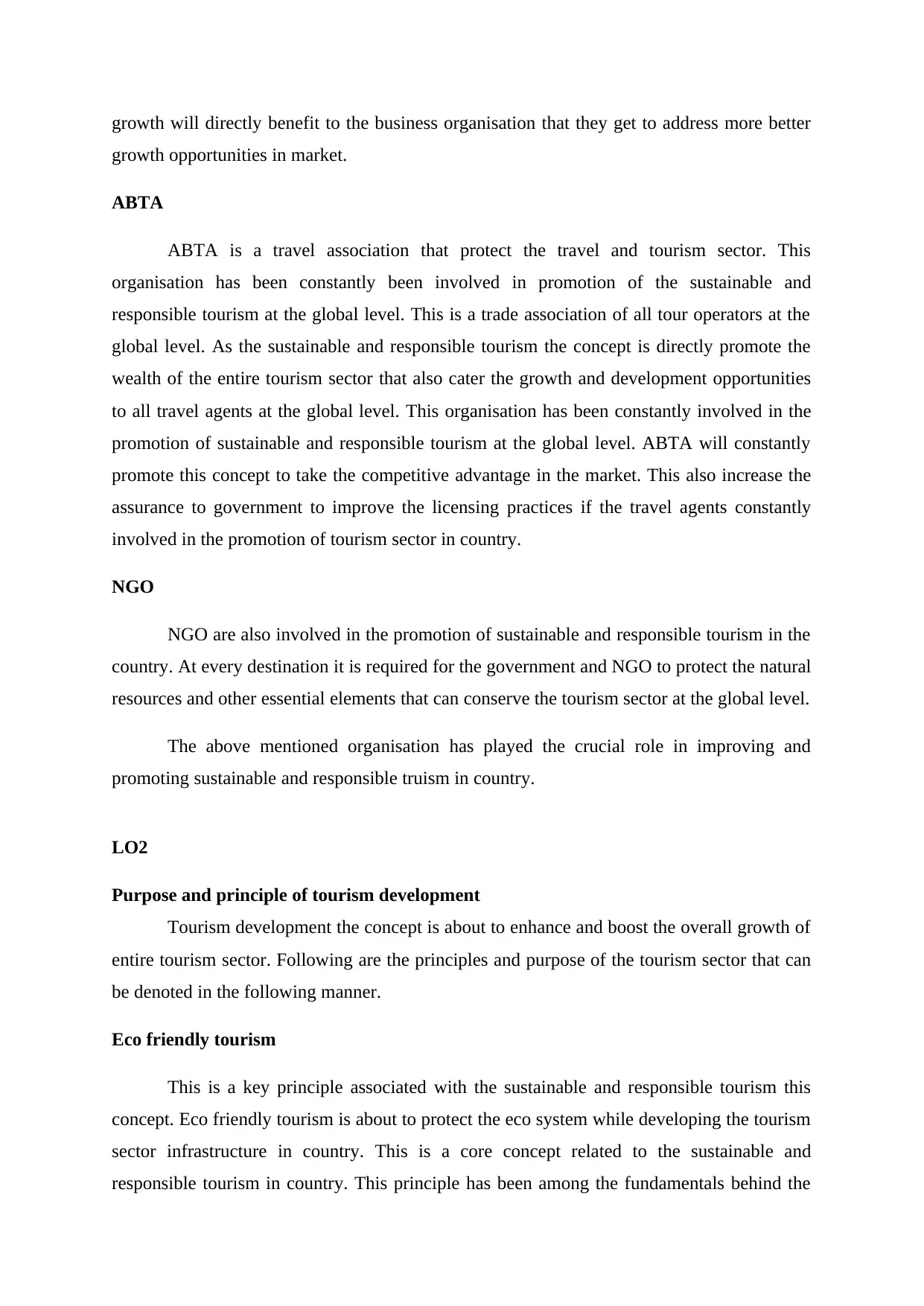
growth will directly benefit to the business organisation that they get to address more better
growth opportunities in market.
ABTA
ABTA is a travel association that protect the travel and tourism sector. This
organisation has been constantly been involved in promotion of the sustainable and
responsible tourism at the global level. This is a trade association of all tour operators at the
global level. As the sustainable and responsible tourism the concept is directly promote the
wealth of the entire tourism sector that also cater the growth and development opportunities
to all travel agents at the global level. This organisation has been constantly involved in the
promotion of sustainable and responsible tourism at the global level. ABTA will constantly
promote this concept to take the competitive advantage in the market. This also increase the
assurance to government to improve the licensing practices if the travel agents constantly
involved in the promotion of tourism sector in country.
NGO
NGO are also involved in the promotion of sustainable and responsible tourism in the
country. At every destination it is required for the government and NGO to protect the natural
resources and other essential elements that can conserve the tourism sector at the global level.
The above mentioned organisation has played the crucial role in improving and
promoting sustainable and responsible truism in country.
LO2
Purpose and principle of tourism development
Tourism development the concept is about to enhance and boost the overall growth of
entire tourism sector. Following are the principles and purpose of the tourism sector that can
be denoted in the following manner.
Eco friendly tourism
This is a key principle associated with the sustainable and responsible tourism this
concept. Eco friendly tourism is about to protect the eco system while developing the tourism
sector infrastructure in country. This is a core concept related to the sustainable and
responsible tourism in country. This principle has been among the fundamentals behind the
growth opportunities in market.
ABTA
ABTA is a travel association that protect the travel and tourism sector. This
organisation has been constantly been involved in promotion of the sustainable and
responsible tourism at the global level. This is a trade association of all tour operators at the
global level. As the sustainable and responsible tourism the concept is directly promote the
wealth of the entire tourism sector that also cater the growth and development opportunities
to all travel agents at the global level. This organisation has been constantly involved in the
promotion of sustainable and responsible tourism at the global level. ABTA will constantly
promote this concept to take the competitive advantage in the market. This also increase the
assurance to government to improve the licensing practices if the travel agents constantly
involved in the promotion of tourism sector in country.
NGO
NGO are also involved in the promotion of sustainable and responsible tourism in the
country. At every destination it is required for the government and NGO to protect the natural
resources and other essential elements that can conserve the tourism sector at the global level.
The above mentioned organisation has played the crucial role in improving and
promoting sustainable and responsible truism in country.
LO2
Purpose and principle of tourism development
Tourism development the concept is about to enhance and boost the overall growth of
entire tourism sector. Following are the principles and purpose of the tourism sector that can
be denoted in the following manner.
Eco friendly tourism
This is a key principle associated with the sustainable and responsible tourism this
concept. Eco friendly tourism is about to protect the eco system while developing the tourism
sector infrastructure in country. This is a core concept related to the sustainable and
responsible tourism in country. This principle has been among the fundamentals behind the
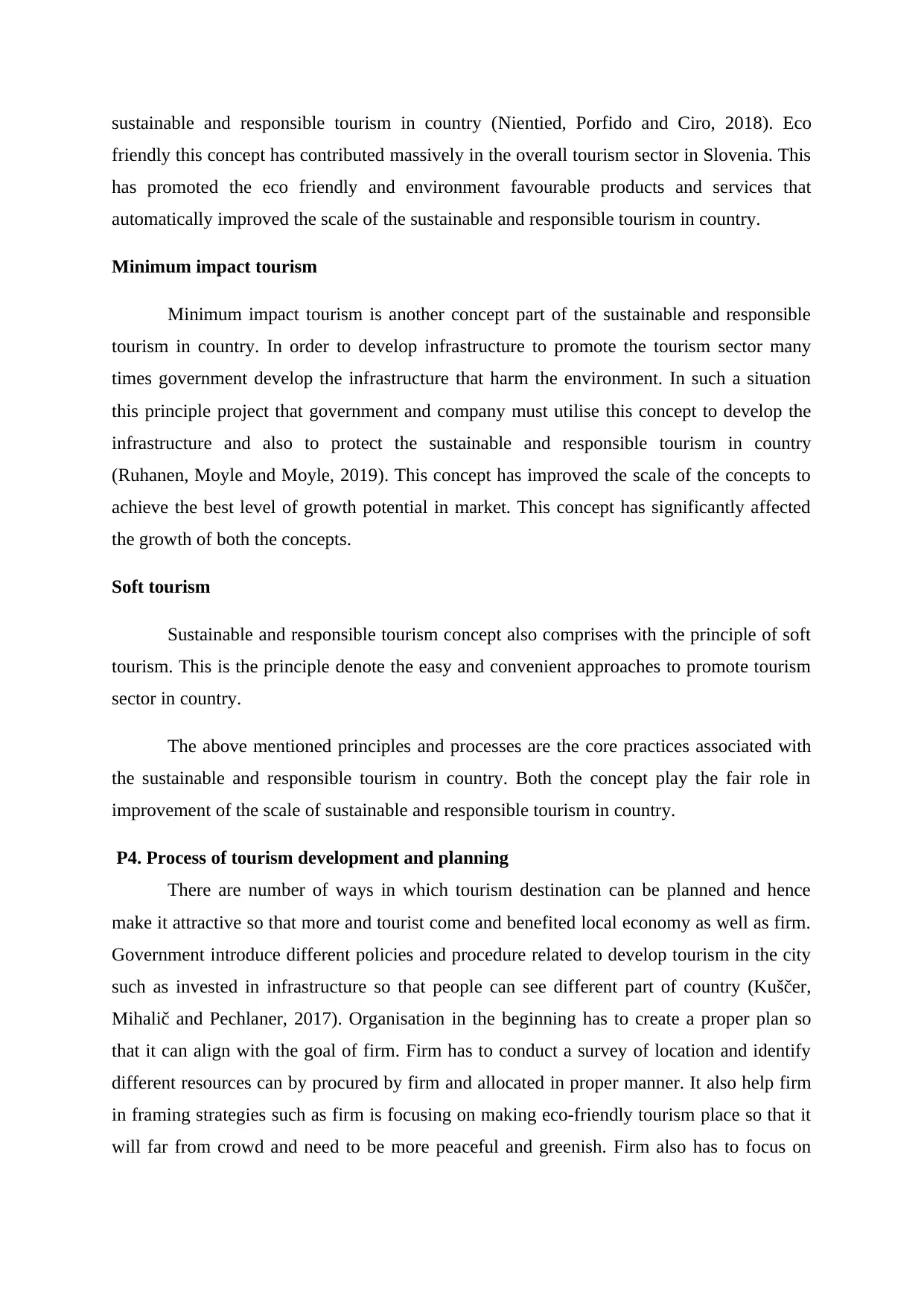
sustainable and responsible tourism in country (Nientied, Porfido and Ciro, 2018). Eco
friendly this concept has contributed massively in the overall tourism sector in Slovenia. This
has promoted the eco friendly and environment favourable products and services that
automatically improved the scale of the sustainable and responsible tourism in country.
Minimum impact tourism
Minimum impact tourism is another concept part of the sustainable and responsible
tourism in country. In order to develop infrastructure to promote the tourism sector many
times government develop the infrastructure that harm the environment. In such a situation
this principle project that government and company must utilise this concept to develop the
infrastructure and also to protect the sustainable and responsible tourism in country
(Ruhanen, Moyle and Moyle, 2019). This concept has improved the scale of the concepts to
achieve the best level of growth potential in market. This concept has significantly affected
the growth of both the concepts.
Soft tourism
Sustainable and responsible tourism concept also comprises with the principle of soft
tourism. This is the principle denote the easy and convenient approaches to promote tourism
sector in country.
The above mentioned principles and processes are the core practices associated with
the sustainable and responsible tourism in country. Both the concept play the fair role in
improvement of the scale of sustainable and responsible tourism in country.
P4. Process of tourism development and planning
There are number of ways in which tourism destination can be planned and hence
make it attractive so that more and tourist come and benefited local economy as well as firm.
Government introduce different policies and procedure related to develop tourism in the city
such as invested in infrastructure so that people can see different part of country (Kuščer,
Mihalič and Pechlaner, 2017). Organisation in the beginning has to create a proper plan so
that it can align with the goal of firm. Firm has to conduct a survey of location and identify
different resources can by procured by firm and allocated in proper manner. It also help firm
in framing strategies such as firm is focusing on making eco-friendly tourism place so that it
will far from crowd and need to be more peaceful and greenish. Firm also has to focus on
friendly this concept has contributed massively in the overall tourism sector in Slovenia. This
has promoted the eco friendly and environment favourable products and services that
automatically improved the scale of the sustainable and responsible tourism in country.
Minimum impact tourism
Minimum impact tourism is another concept part of the sustainable and responsible
tourism in country. In order to develop infrastructure to promote the tourism sector many
times government develop the infrastructure that harm the environment. In such a situation
this principle project that government and company must utilise this concept to develop the
infrastructure and also to protect the sustainable and responsible tourism in country
(Ruhanen, Moyle and Moyle, 2019). This concept has improved the scale of the concepts to
achieve the best level of growth potential in market. This concept has significantly affected
the growth of both the concepts.
Soft tourism
Sustainable and responsible tourism concept also comprises with the principle of soft
tourism. This is the principle denote the easy and convenient approaches to promote tourism
sector in country.
The above mentioned principles and processes are the core practices associated with
the sustainable and responsible tourism in country. Both the concept play the fair role in
improvement of the scale of sustainable and responsible tourism in country.
P4. Process of tourism development and planning
There are number of ways in which tourism destination can be planned and hence
make it attractive so that more and tourist come and benefited local economy as well as firm.
Government introduce different policies and procedure related to develop tourism in the city
such as invested in infrastructure so that people can see different part of country (Kuščer,
Mihalič and Pechlaner, 2017). Organisation in the beginning has to create a proper plan so
that it can align with the goal of firm. Firm has to conduct a survey of location and identify
different resources can by procured by firm and allocated in proper manner. It also help firm
in framing strategies such as firm is focusing on making eco-friendly tourism place so that it
will far from crowd and need to be more peaceful and greenish. Firm also has to focus on
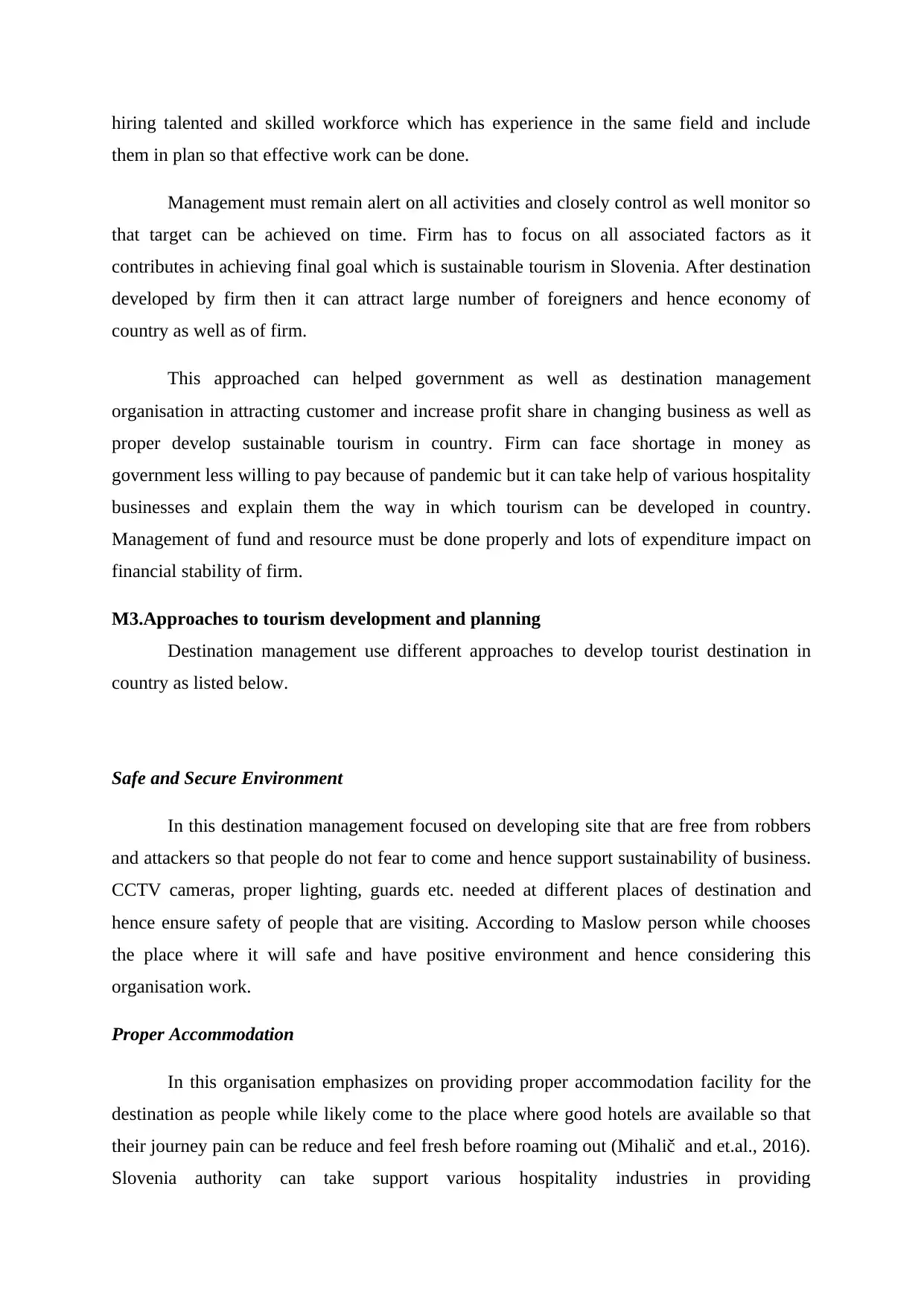
hiring talented and skilled workforce which has experience in the same field and include
them in plan so that effective work can be done.
Management must remain alert on all activities and closely control as well monitor so
that target can be achieved on time. Firm has to focus on all associated factors as it
contributes in achieving final goal which is sustainable tourism in Slovenia. After destination
developed by firm then it can attract large number of foreigners and hence economy of
country as well as of firm.
This approached can helped government as well as destination management
organisation in attracting customer and increase profit share in changing business as well as
proper develop sustainable tourism in country. Firm can face shortage in money as
government less willing to pay because of pandemic but it can take help of various hospitality
businesses and explain them the way in which tourism can be developed in country.
Management of fund and resource must be done properly and lots of expenditure impact on
financial stability of firm.
M3.Approaches to tourism development and planning
Destination management use different approaches to develop tourist destination in
country as listed below.
Safe and Secure Environment
In this destination management focused on developing site that are free from robbers
and attackers so that people do not fear to come and hence support sustainability of business.
CCTV cameras, proper lighting, guards etc. needed at different places of destination and
hence ensure safety of people that are visiting. According to Maslow person while chooses
the place where it will safe and have positive environment and hence considering this
organisation work.
Proper Accommodation
In this organisation emphasizes on providing proper accommodation facility for the
destination as people while likely come to the place where good hotels are available so that
their journey pain can be reduce and feel fresh before roaming out (Mihalič and et.al., 2016).
Slovenia authority can take support various hospitality industries in providing
them in plan so that effective work can be done.
Management must remain alert on all activities and closely control as well monitor so
that target can be achieved on time. Firm has to focus on all associated factors as it
contributes in achieving final goal which is sustainable tourism in Slovenia. After destination
developed by firm then it can attract large number of foreigners and hence economy of
country as well as of firm.
This approached can helped government as well as destination management
organisation in attracting customer and increase profit share in changing business as well as
proper develop sustainable tourism in country. Firm can face shortage in money as
government less willing to pay because of pandemic but it can take help of various hospitality
businesses and explain them the way in which tourism can be developed in country.
Management of fund and resource must be done properly and lots of expenditure impact on
financial stability of firm.
M3.Approaches to tourism development and planning
Destination management use different approaches to develop tourist destination in
country as listed below.
Safe and Secure Environment
In this destination management focused on developing site that are free from robbers
and attackers so that people do not fear to come and hence support sustainability of business.
CCTV cameras, proper lighting, guards etc. needed at different places of destination and
hence ensure safety of people that are visiting. According to Maslow person while chooses
the place where it will safe and have positive environment and hence considering this
organisation work.
Proper Accommodation
In this organisation emphasizes on providing proper accommodation facility for the
destination as people while likely come to the place where good hotels are available so that
their journey pain can be reduce and feel fresh before roaming out (Mihalič and et.al., 2016).
Slovenia authority can take support various hospitality industries in providing
Paraphrase This Document
Need a fresh take? Get an instant paraphrase of this document with our AI Paraphraser
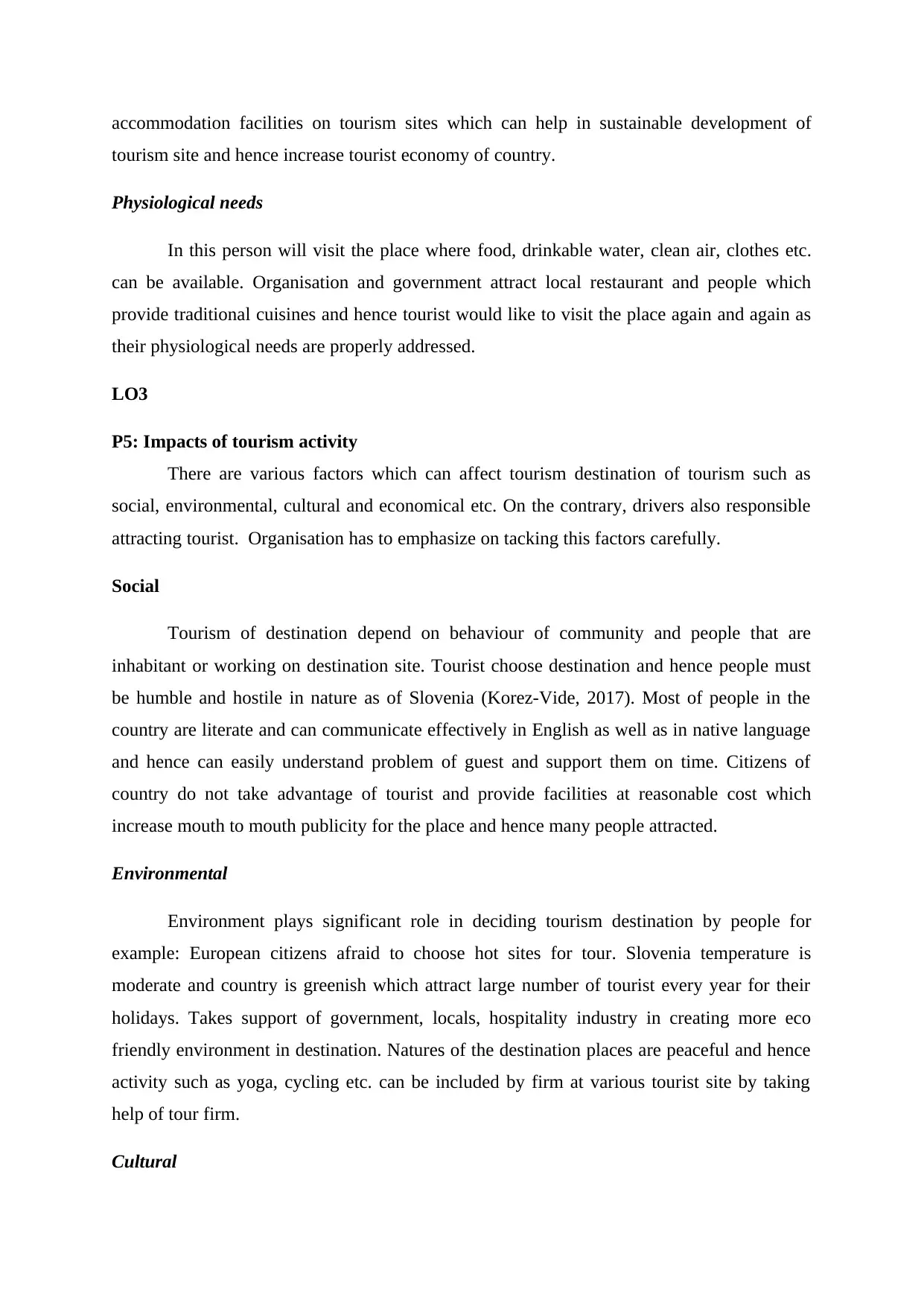
accommodation facilities on tourism sites which can help in sustainable development of
tourism site and hence increase tourist economy of country.
Physiological needs
In this person will visit the place where food, drinkable water, clean air, clothes etc.
can be available. Organisation and government attract local restaurant and people which
provide traditional cuisines and hence tourist would like to visit the place again and again as
their physiological needs are properly addressed.
LO3
P5: Impacts of tourism activity
There are various factors which can affect tourism destination of tourism such as
social, environmental, cultural and economical etc. On the contrary, drivers also responsible
attracting tourist. Organisation has to emphasize on tacking this factors carefully.
Social
Tourism of destination depend on behaviour of community and people that are
inhabitant or working on destination site. Tourist choose destination and hence people must
be humble and hostile in nature as of Slovenia (Korez-Vide, 2017). Most of people in the
country are literate and can communicate effectively in English as well as in native language
and hence can easily understand problem of guest and support them on time. Citizens of
country do not take advantage of tourist and provide facilities at reasonable cost which
increase mouth to mouth publicity for the place and hence many people attracted.
Environmental
Environment plays significant role in deciding tourism destination by people for
example: European citizens afraid to choose hot sites for tour. Slovenia temperature is
moderate and country is greenish which attract large number of tourist every year for their
holidays. Takes support of government, locals, hospitality industry in creating more eco
friendly environment in destination. Natures of the destination places are peaceful and hence
activity such as yoga, cycling etc. can be included by firm at various tourist site by taking
help of tour firm.
Cultural
tourism site and hence increase tourist economy of country.
Physiological needs
In this person will visit the place where food, drinkable water, clean air, clothes etc.
can be available. Organisation and government attract local restaurant and people which
provide traditional cuisines and hence tourist would like to visit the place again and again as
their physiological needs are properly addressed.
LO3
P5: Impacts of tourism activity
There are various factors which can affect tourism destination of tourism such as
social, environmental, cultural and economical etc. On the contrary, drivers also responsible
attracting tourist. Organisation has to emphasize on tacking this factors carefully.
Social
Tourism of destination depend on behaviour of community and people that are
inhabitant or working on destination site. Tourist choose destination and hence people must
be humble and hostile in nature as of Slovenia (Korez-Vide, 2017). Most of people in the
country are literate and can communicate effectively in English as well as in native language
and hence can easily understand problem of guest and support them on time. Citizens of
country do not take advantage of tourist and provide facilities at reasonable cost which
increase mouth to mouth publicity for the place and hence many people attracted.
Environmental
Environment plays significant role in deciding tourism destination by people for
example: European citizens afraid to choose hot sites for tour. Slovenia temperature is
moderate and country is greenish which attract large number of tourist every year for their
holidays. Takes support of government, locals, hospitality industry in creating more eco
friendly environment in destination. Natures of the destination places are peaceful and hence
activity such as yoga, cycling etc. can be included by firm at various tourist site by taking
help of tour firm.
Cultural
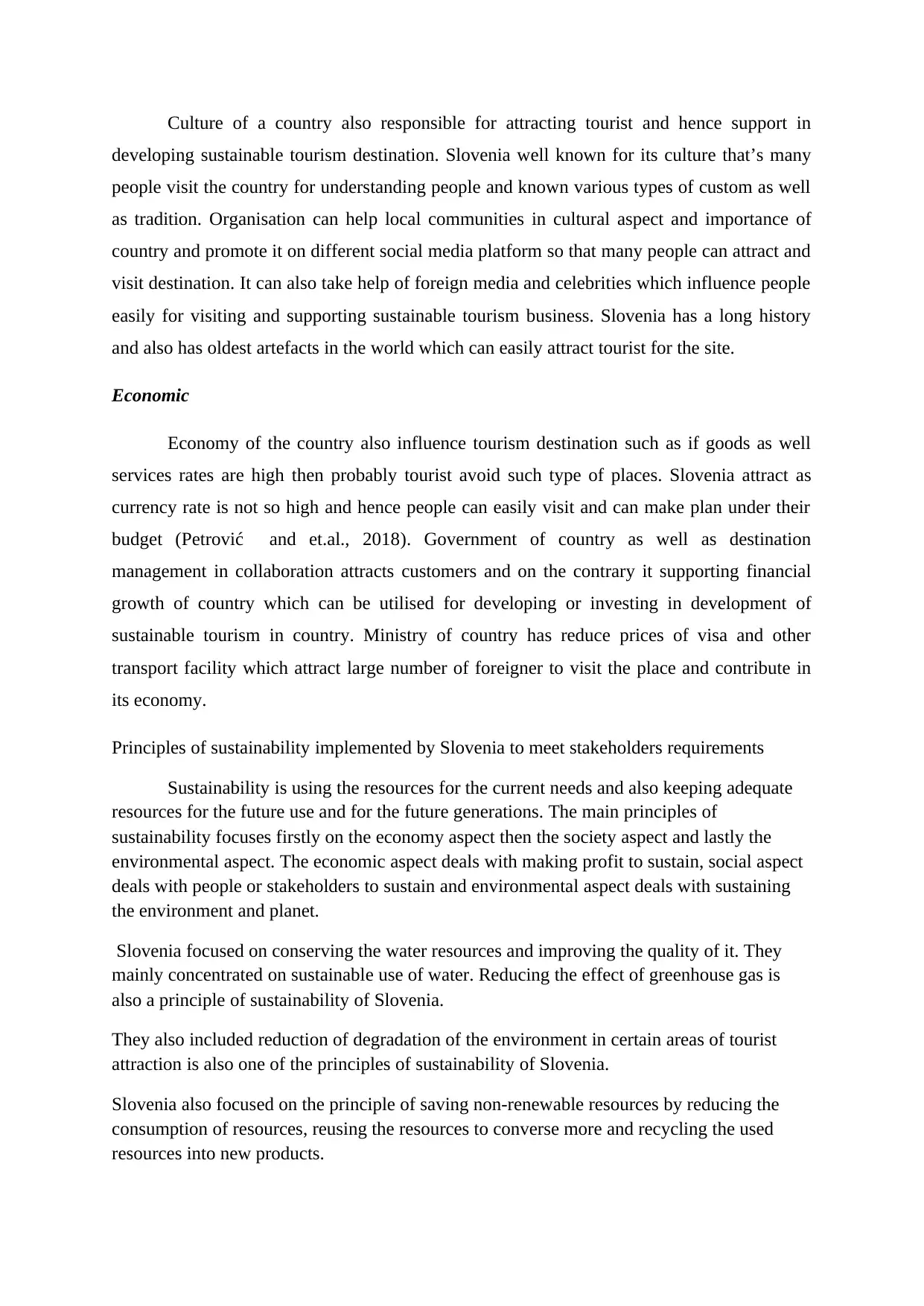
Culture of a country also responsible for attracting tourist and hence support in
developing sustainable tourism destination. Slovenia well known for its culture that’s many
people visit the country for understanding people and known various types of custom as well
as tradition. Organisation can help local communities in cultural aspect and importance of
country and promote it on different social media platform so that many people can attract and
visit destination. It can also take help of foreign media and celebrities which influence people
easily for visiting and supporting sustainable tourism business. Slovenia has a long history
and also has oldest artefacts in the world which can easily attract tourist for the site.
Economic
Economy of the country also influence tourism destination such as if goods as well
services rates are high then probably tourist avoid such type of places. Slovenia attract as
currency rate is not so high and hence people can easily visit and can make plan under their
budget (Petrović and et.al., 2018). Government of country as well as destination
management in collaboration attracts customers and on the contrary it supporting financial
growth of country which can be utilised for developing or investing in development of
sustainable tourism in country. Ministry of country has reduce prices of visa and other
transport facility which attract large number of foreigner to visit the place and contribute in
its economy.
Principles of sustainability implemented by Slovenia to meet stakeholders requirements
Sustainability is using the resources for the current needs and also keeping adequate
resources for the future use and for the future generations. The main principles of
sustainability focuses firstly on the economy aspect then the society aspect and lastly the
environmental aspect. The economic aspect deals with making profit to sustain, social aspect
deals with people or stakeholders to sustain and environmental aspect deals with sustaining
the environment and planet.
Slovenia focused on conserving the water resources and improving the quality of it. They
mainly concentrated on sustainable use of water. Reducing the effect of greenhouse gas is
also a principle of sustainability of Slovenia.
They also included reduction of degradation of the environment in certain areas of tourist
attraction is also one of the principles of sustainability of Slovenia.
Slovenia also focused on the principle of saving non-renewable resources by reducing the
consumption of resources, reusing the resources to converse more and recycling the used
resources into new products.
developing sustainable tourism destination. Slovenia well known for its culture that’s many
people visit the country for understanding people and known various types of custom as well
as tradition. Organisation can help local communities in cultural aspect and importance of
country and promote it on different social media platform so that many people can attract and
visit destination. It can also take help of foreign media and celebrities which influence people
easily for visiting and supporting sustainable tourism business. Slovenia has a long history
and also has oldest artefacts in the world which can easily attract tourist for the site.
Economic
Economy of the country also influence tourism destination such as if goods as well
services rates are high then probably tourist avoid such type of places. Slovenia attract as
currency rate is not so high and hence people can easily visit and can make plan under their
budget (Petrović and et.al., 2018). Government of country as well as destination
management in collaboration attracts customers and on the contrary it supporting financial
growth of country which can be utilised for developing or investing in development of
sustainable tourism in country. Ministry of country has reduce prices of visa and other
transport facility which attract large number of foreigner to visit the place and contribute in
its economy.
Principles of sustainability implemented by Slovenia to meet stakeholders requirements
Sustainability is using the resources for the current needs and also keeping adequate
resources for the future use and for the future generations. The main principles of
sustainability focuses firstly on the economy aspect then the society aspect and lastly the
environmental aspect. The economic aspect deals with making profit to sustain, social aspect
deals with people or stakeholders to sustain and environmental aspect deals with sustaining
the environment and planet.
Slovenia focused on conserving the water resources and improving the quality of it. They
mainly concentrated on sustainable use of water. Reducing the effect of greenhouse gas is
also a principle of sustainability of Slovenia.
They also included reduction of degradation of the environment in certain areas of tourist
attraction is also one of the principles of sustainability of Slovenia.
Slovenia also focused on the principle of saving non-renewable resources by reducing the
consumption of resources, reusing the resources to converse more and recycling the used
resources into new products.
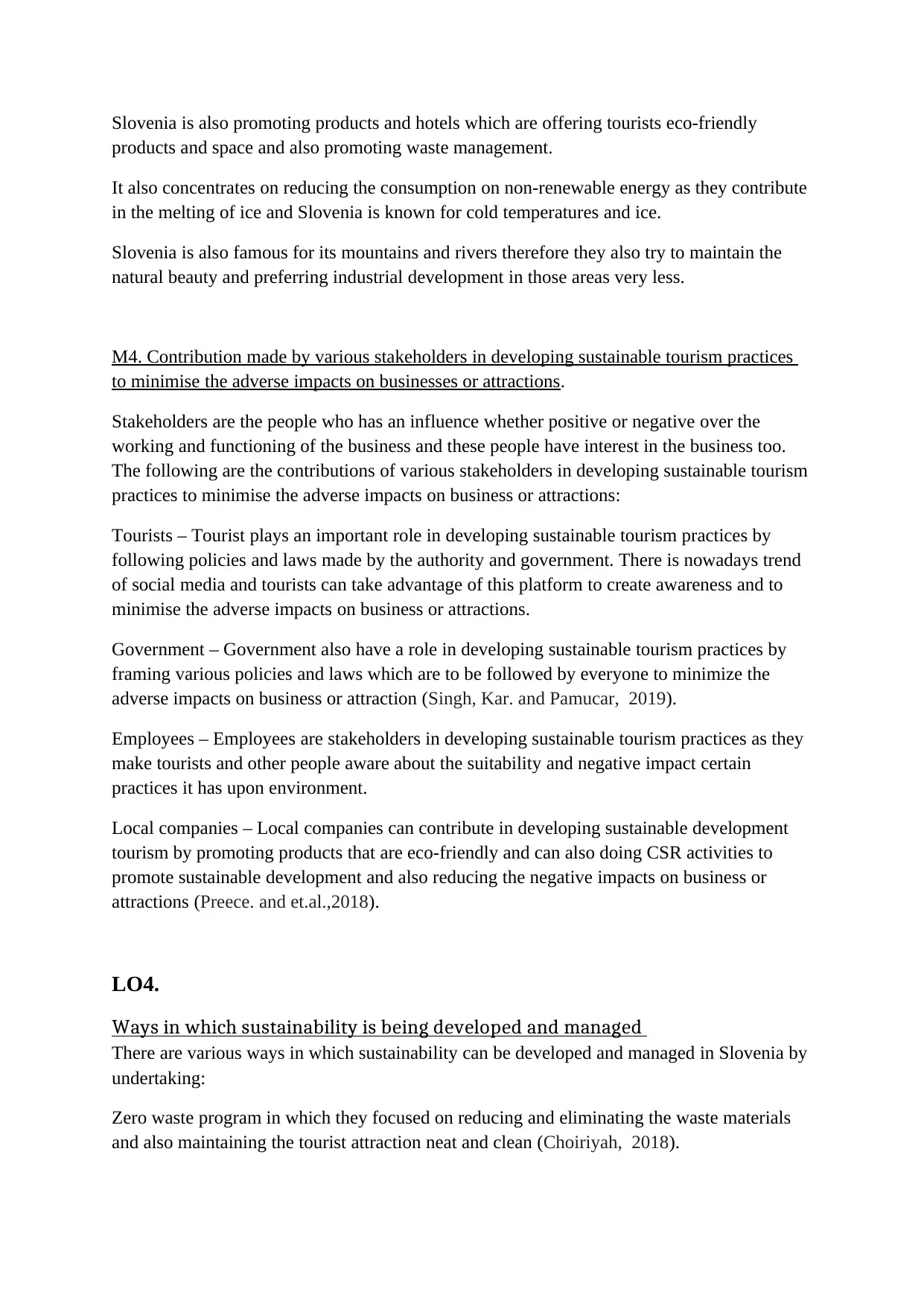
Slovenia is also promoting products and hotels which are offering tourists eco-friendly
products and space and also promoting waste management.
It also concentrates on reducing the consumption on non-renewable energy as they contribute
in the melting of ice and Slovenia is known for cold temperatures and ice.
Slovenia is also famous for its mountains and rivers therefore they also try to maintain the
natural beauty and preferring industrial development in those areas very less.
M4. Contribution made by various stakeholders in developing sustainable tourism practices
to minimise the adverse impacts on businesses or attractions.
Stakeholders are the people who has an influence whether positive or negative over the
working and functioning of the business and these people have interest in the business too.
The following are the contributions of various stakeholders in developing sustainable tourism
practices to minimise the adverse impacts on business or attractions:
Tourists – Tourist plays an important role in developing sustainable tourism practices by
following policies and laws made by the authority and government. There is nowadays trend
of social media and tourists can take advantage of this platform to create awareness and to
minimise the adverse impacts on business or attractions.
Government – Government also have a role in developing sustainable tourism practices by
framing various policies and laws which are to be followed by everyone to minimize the
adverse impacts on business or attraction (Singh, Kar. and Pamucar, 2019).
Employees – Employees are stakeholders in developing sustainable tourism practices as they
make tourists and other people aware about the suitability and negative impact certain
practices it has upon environment.
Local companies – Local companies can contribute in developing sustainable development
tourism by promoting products that are eco-friendly and can also doing CSR activities to
promote sustainable development and also reducing the negative impacts on business or
attractions (Preece. and et.al.,2018).
LO4.
Ways in which sustainability is being developed and managed
There are various ways in which sustainability can be developed and managed in Slovenia by
undertaking:
Zero waste program in which they focused on reducing and eliminating the waste materials
and also maintaining the tourist attraction neat and clean (Choiriyah, 2018).
products and space and also promoting waste management.
It also concentrates on reducing the consumption on non-renewable energy as they contribute
in the melting of ice and Slovenia is known for cold temperatures and ice.
Slovenia is also famous for its mountains and rivers therefore they also try to maintain the
natural beauty and preferring industrial development in those areas very less.
M4. Contribution made by various stakeholders in developing sustainable tourism practices
to minimise the adverse impacts on businesses or attractions.
Stakeholders are the people who has an influence whether positive or negative over the
working and functioning of the business and these people have interest in the business too.
The following are the contributions of various stakeholders in developing sustainable tourism
practices to minimise the adverse impacts on business or attractions:
Tourists – Tourist plays an important role in developing sustainable tourism practices by
following policies and laws made by the authority and government. There is nowadays trend
of social media and tourists can take advantage of this platform to create awareness and to
minimise the adverse impacts on business or attractions.
Government – Government also have a role in developing sustainable tourism practices by
framing various policies and laws which are to be followed by everyone to minimize the
adverse impacts on business or attraction (Singh, Kar. and Pamucar, 2019).
Employees – Employees are stakeholders in developing sustainable tourism practices as they
make tourists and other people aware about the suitability and negative impact certain
practices it has upon environment.
Local companies – Local companies can contribute in developing sustainable development
tourism by promoting products that are eco-friendly and can also doing CSR activities to
promote sustainable development and also reducing the negative impacts on business or
attractions (Preece. and et.al.,2018).
LO4.
Ways in which sustainability is being developed and managed
There are various ways in which sustainability can be developed and managed in Slovenia by
undertaking:
Zero waste program in which they focused on reducing and eliminating the waste materials
and also maintaining the tourist attraction neat and clean (Choiriyah, 2018).
Secure Best Marks with AI Grader
Need help grading? Try our AI Grader for instant feedback on your assignments.
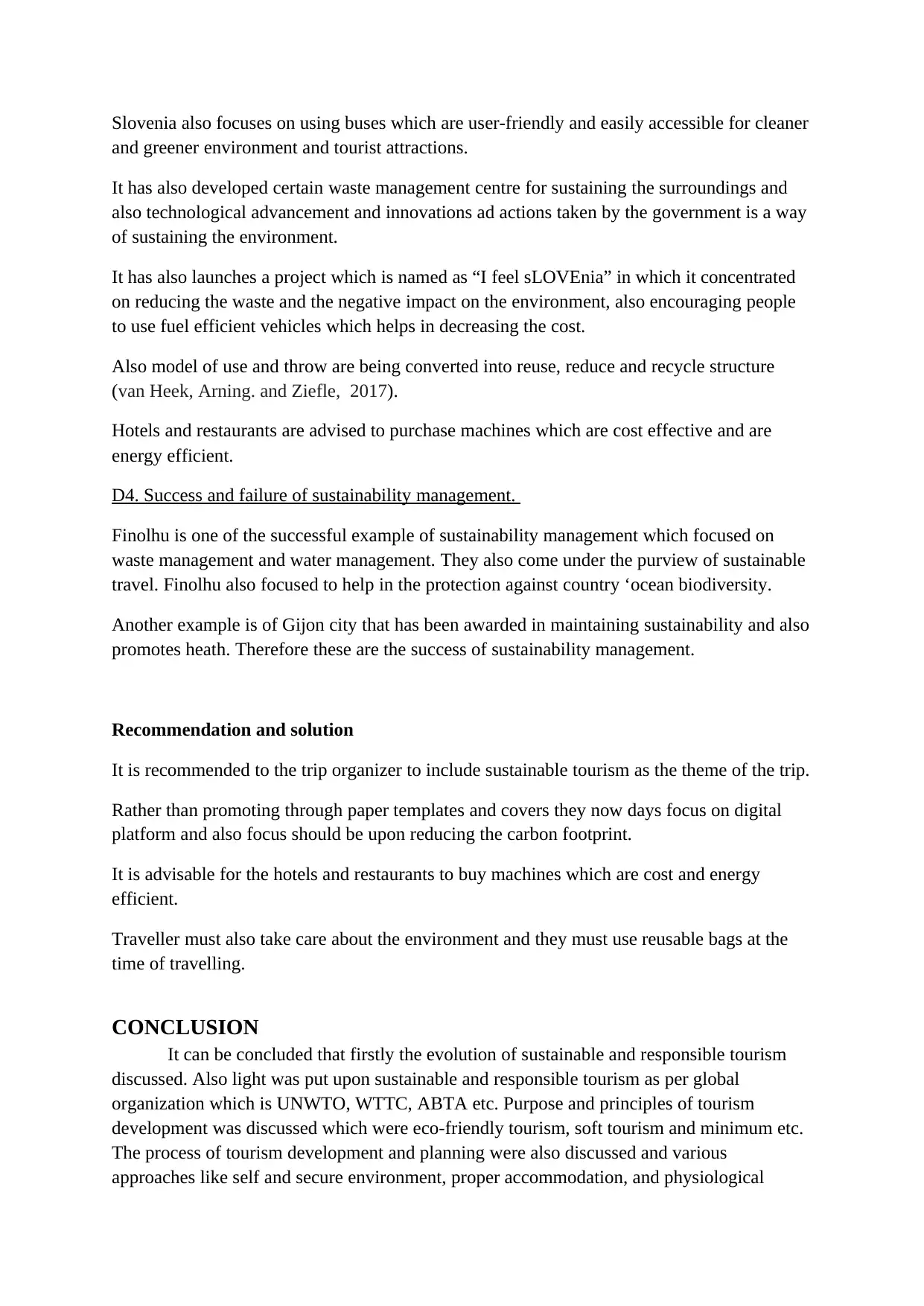
Slovenia also focuses on using buses which are user-friendly and easily accessible for cleaner
and greener environment and tourist attractions.
It has also developed certain waste management centre for sustaining the surroundings and
also technological advancement and innovations ad actions taken by the government is a way
of sustaining the environment.
It has also launches a project which is named as “I feel sLOVEnia” in which it concentrated
on reducing the waste and the negative impact on the environment, also encouraging people
to use fuel efficient vehicles which helps in decreasing the cost.
Also model of use and throw are being converted into reuse, reduce and recycle structure
(van Heek, Arning. and Ziefle, 2017).
Hotels and restaurants are advised to purchase machines which are cost effective and are
energy efficient.
D4. Success and failure of sustainability management.
Finolhu is one of the successful example of sustainability management which focused on
waste management and water management. They also come under the purview of sustainable
travel. Finolhu also focused to help in the protection against country ‘ocean biodiversity.
Another example is of Gijon city that has been awarded in maintaining sustainability and also
promotes heath. Therefore these are the success of sustainability management.
Recommendation and solution
It is recommended to the trip organizer to include sustainable tourism as the theme of the trip.
Rather than promoting through paper templates and covers they now days focus on digital
platform and also focus should be upon reducing the carbon footprint.
It is advisable for the hotels and restaurants to buy machines which are cost and energy
efficient.
Traveller must also take care about the environment and they must use reusable bags at the
time of travelling.
CONCLUSION
It can be concluded that firstly the evolution of sustainable and responsible tourism
discussed. Also light was put upon sustainable and responsible tourism as per global
organization which is UNWTO, WTTC, ABTA etc. Purpose and principles of tourism
development was discussed which were eco-friendly tourism, soft tourism and minimum etc.
The process of tourism development and planning were also discussed and various
approaches like self and secure environment, proper accommodation, and physiological
and greener environment and tourist attractions.
It has also developed certain waste management centre for sustaining the surroundings and
also technological advancement and innovations ad actions taken by the government is a way
of sustaining the environment.
It has also launches a project which is named as “I feel sLOVEnia” in which it concentrated
on reducing the waste and the negative impact on the environment, also encouraging people
to use fuel efficient vehicles which helps in decreasing the cost.
Also model of use and throw are being converted into reuse, reduce and recycle structure
(van Heek, Arning. and Ziefle, 2017).
Hotels and restaurants are advised to purchase machines which are cost effective and are
energy efficient.
D4. Success and failure of sustainability management.
Finolhu is one of the successful example of sustainability management which focused on
waste management and water management. They also come under the purview of sustainable
travel. Finolhu also focused to help in the protection against country ‘ocean biodiversity.
Another example is of Gijon city that has been awarded in maintaining sustainability and also
promotes heath. Therefore these are the success of sustainability management.
Recommendation and solution
It is recommended to the trip organizer to include sustainable tourism as the theme of the trip.
Rather than promoting through paper templates and covers they now days focus on digital
platform and also focus should be upon reducing the carbon footprint.
It is advisable for the hotels and restaurants to buy machines which are cost and energy
efficient.
Traveller must also take care about the environment and they must use reusable bags at the
time of travelling.
CONCLUSION
It can be concluded that firstly the evolution of sustainable and responsible tourism
discussed. Also light was put upon sustainable and responsible tourism as per global
organization which is UNWTO, WTTC, ABTA etc. Purpose and principles of tourism
development was discussed which were eco-friendly tourism, soft tourism and minimum etc.
The process of tourism development and planning were also discussed and various
approaches like self and secure environment, proper accommodation, and physiological

needs. The tourism activity has the following impact which consist of social aspect, cultural
aspect economical aspect of the business. There are various Contribution made by various
stakeholders in developing sustainable tourism practices to minimise the adverse impacts on
businesses or attractions. Various ways have been discussed by sustainability can be
developed and managed.
aspect economical aspect of the business. There are various Contribution made by various
stakeholders in developing sustainable tourism practices to minimise the adverse impacts on
businesses or attractions. Various ways have been discussed by sustainability can be
developed and managed.
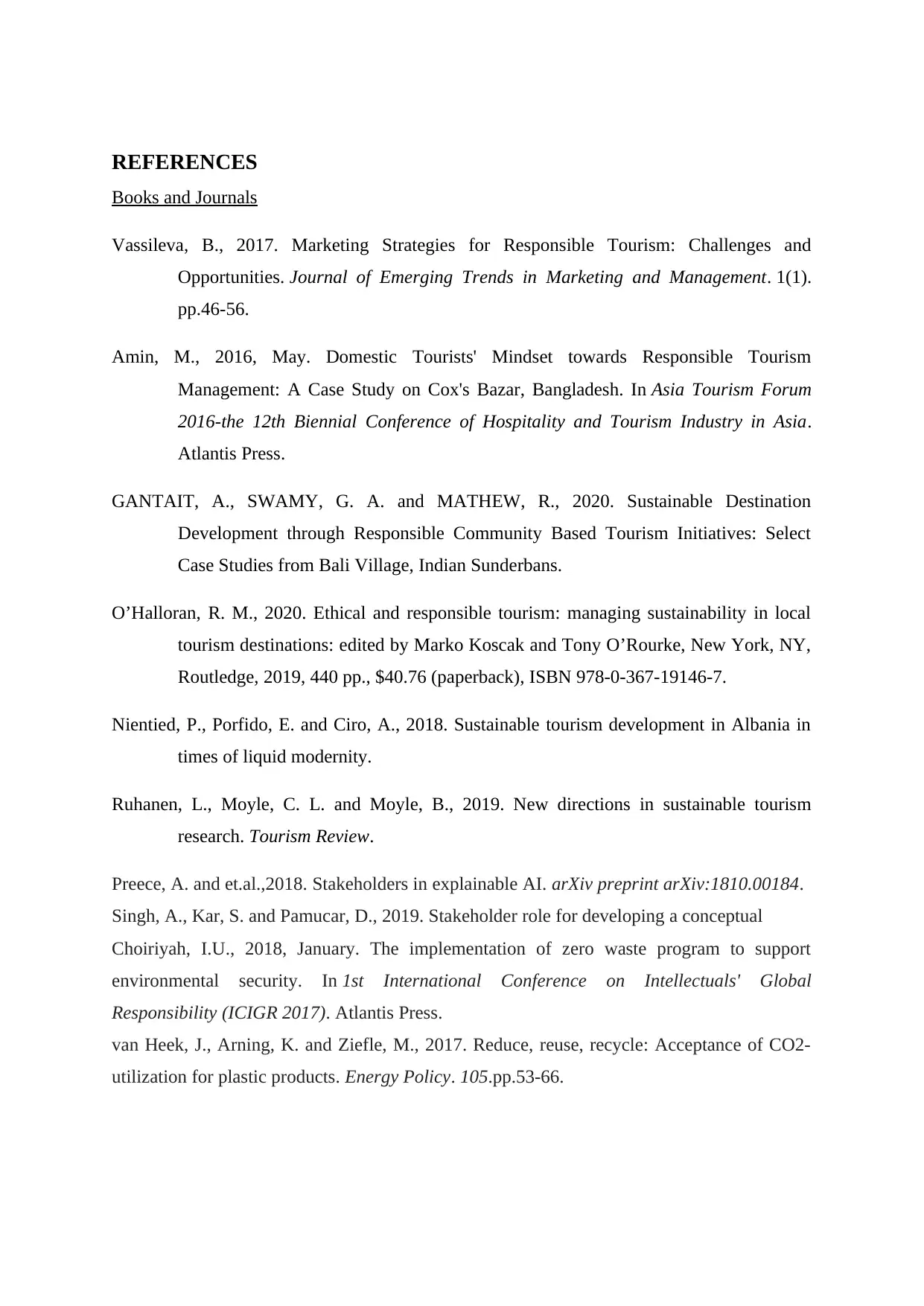
REFERENCES
Books and Journals
Vassileva, B., 2017. Marketing Strategies for Responsible Tourism: Challenges and
Opportunities. Journal of Emerging Trends in Marketing and Management. 1(1).
pp.46-56.
Amin, M., 2016, May. Domestic Tourists' Mindset towards Responsible Tourism
Management: A Case Study on Cox's Bazar, Bangladesh. In Asia Tourism Forum
2016-the 12th Biennial Conference of Hospitality and Tourism Industry in Asia.
Atlantis Press.
GANTAIT, A., SWAMY, G. A. and MATHEW, R., 2020. Sustainable Destination
Development through Responsible Community Based Tourism Initiatives: Select
Case Studies from Bali Village, Indian Sunderbans.
O’Halloran, R. M., 2020. Ethical and responsible tourism: managing sustainability in local
tourism destinations: edited by Marko Koscak and Tony O’Rourke, New York, NY,
Routledge, 2019, 440 pp., $40.76 (paperback), ISBN 978-0-367-19146-7.
Nientied, P., Porfido, E. and Ciro, A., 2018. Sustainable tourism development in Albania in
times of liquid modernity.
Ruhanen, L., Moyle, C. L. and Moyle, B., 2019. New directions in sustainable tourism
research. Tourism Review.
Preece, A. and et.al.,2018. Stakeholders in explainable AI. arXiv preprint arXiv:1810.00184.
Singh, A., Kar, S. and Pamucar, D., 2019. Stakeholder role for developing a conceptual
Choiriyah, I.U., 2018, January. The implementation of zero waste program to support
environmental security. In 1st International Conference on Intellectuals' Global
Responsibility (ICIGR 2017). Atlantis Press.
van Heek, J., Arning, K. and Ziefle, M., 2017. Reduce, reuse, recycle: Acceptance of CO2-
utilization for plastic products. Energy Policy. 105.pp.53-66.
Books and Journals
Vassileva, B., 2017. Marketing Strategies for Responsible Tourism: Challenges and
Opportunities. Journal of Emerging Trends in Marketing and Management. 1(1).
pp.46-56.
Amin, M., 2016, May. Domestic Tourists' Mindset towards Responsible Tourism
Management: A Case Study on Cox's Bazar, Bangladesh. In Asia Tourism Forum
2016-the 12th Biennial Conference of Hospitality and Tourism Industry in Asia.
Atlantis Press.
GANTAIT, A., SWAMY, G. A. and MATHEW, R., 2020. Sustainable Destination
Development through Responsible Community Based Tourism Initiatives: Select
Case Studies from Bali Village, Indian Sunderbans.
O’Halloran, R. M., 2020. Ethical and responsible tourism: managing sustainability in local
tourism destinations: edited by Marko Koscak and Tony O’Rourke, New York, NY,
Routledge, 2019, 440 pp., $40.76 (paperback), ISBN 978-0-367-19146-7.
Nientied, P., Porfido, E. and Ciro, A., 2018. Sustainable tourism development in Albania in
times of liquid modernity.
Ruhanen, L., Moyle, C. L. and Moyle, B., 2019. New directions in sustainable tourism
research. Tourism Review.
Preece, A. and et.al.,2018. Stakeholders in explainable AI. arXiv preprint arXiv:1810.00184.
Singh, A., Kar, S. and Pamucar, D., 2019. Stakeholder role for developing a conceptual
Choiriyah, I.U., 2018, January. The implementation of zero waste program to support
environmental security. In 1st International Conference on Intellectuals' Global
Responsibility (ICIGR 2017). Atlantis Press.
van Heek, J., Arning, K. and Ziefle, M., 2017. Reduce, reuse, recycle: Acceptance of CO2-
utilization for plastic products. Energy Policy. 105.pp.53-66.
1 out of 13
Related Documents
Your All-in-One AI-Powered Toolkit for Academic Success.
+13062052269
info@desklib.com
Available 24*7 on WhatsApp / Email
![[object Object]](/_next/static/media/star-bottom.7253800d.svg)
Unlock your academic potential
© 2024 | Zucol Services PVT LTD | All rights reserved.





